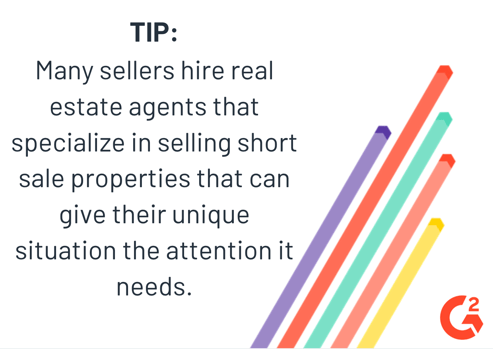May 22, 2019
 by Izabelle Hundrev / May 22, 2019
by Izabelle Hundrev / May 22, 2019

No matter what it is that you’re shopping for, it’s always exciting when you get a discount on something you want. After all, who doesn’t love a good deal?
Unfortunately, when it comes to buying real estate, there’s not exactly a “clearance” section for discount properties. That being said, there are situations in which real estate buyers can buy a property under market value. One of these situations is through a short sale.
In real estate, a short sale is when a property is sold for less than the balance that is owed on the mortgage.
At first glance, buying a short sale property might seem like an easy way to score a good deal. While that may be the case, there are a lot of important factors to consider before moving forward with this type of property transaction. In this article, we’ll walk through the basics of the short sales process, and cover all the benefits and drawbacks for the parties that are involved in it.
Looking for specific information about short sales? Use the links below to jump ahead.
In a short sale, a property owner sells their home for an amount that is less than what they owe on their current mortgage. In order for the sale to clear, the mortgage lender has to give permission since they are not getting back the full amount they initially lent.
For example, say that a homeowner is consistently running behind on mortgage payments and the market value of their home has fallen drastically. If they think they can no longer keep up, they have two options: foreclose on the property or initiate a short sale.
To avoid the credit damage and legal headache that comes with foreclosure, the owner can opt to sell their home at a lower price and fall “short” on their mortgage balance. If the lender agrees, the homeowner will put their home up for sale and begin looking for buyers.
A homeowner in a difficult financial situation might find themselves considering either a short sale or foreclosure as their final options. Since these two terms are similar, it’s easy to see how they can get mixed up.
In a foreclosure, a mortgage lender (usually a bank) will take ownership of a property if the owner defaults of their mortgage payments. This is a lengthy legal process that results in major damage to the homeowner’s credit. Once the property becomes bank-owned, the owner must vacate the property. From there, the bank will try to sell the home to recoup their financial losses.
In a short sale, the property owner has full control during the sales process and is able to stay in their home during this time period. They are fully responsible for finding a real estate agent and buyers. A short sale will still have significant negative impact on the owner’s credit score, but the severity will depend on their unique credit history.
Despite being a lengthy and complicated process, a short sale can be mutually beneficial for the buyer, seller and lender for several reasons:
For the seller or property owner, opting for a short sale is usually considered to be more beneficial than filing for foreclosure. Although their credit score will still be impacted negatively, the seller will have control over the sales process and be permitted to stay on the property. If they find a buyer and the sale is approved, the property owner usually doesn’t have to cover closing or broker costs.

In a short sale, the main benefit for mortgage lenders is avoiding foreclosure. Foreclosure is a lengthy process that can incur hefty legal fees. A lender who is looking to gain some return on their investment may opt for a short sale to avoid the time and money associated with foreclosure. Luckily, the ball is in their court. The lender has the authority to approve or deny the property owner’s short sale request as they see fit.
The main benefit is low price. Buyers know that both the lender and seller are trying to get this property off their hands, giving them more leeway to make a low-ball offer. Also, most inexperienced buyers shy away from or are unfamiliar with short sale properties, which eliminates a lot of the competition.
Despite having some benefits, there a quite a few drawbacks of a short sale that affect all the parties involved:
For property owners, a short sale is not an ideal situation to be in. If they have been led to consider short sale as an option, they’re lacking financial stability. And in most cases, the only reason an owner would choose to go this route is to avoid foreclosure.
Their request to initiate a short sale could be denied by the lender altogether. They must write a hardship letter explaining their current financial status, with pay stubs and tax forms to back it up. If it’s approved, the process of selling the home and negotiating with buyers is incredibly lengthy and complicated since it also involves the lender. If the sale goes through, the owner will walk away with nothing and may have a hard time buying property in the future.
Lenders are going to take a hard hit from a short sale. No matter what, they are losing money. It’s just a matter of determining how much money they can recoup in a short sale versus going through the entire foreclosure process.
Before buying a short sale property, buyers need to be aware of several possible pitfalls. A short sale property that might seem like a good deal could also come with a lot of hidden costs, such as closing costs or repairs. Since the seller is in a tough financial situation, it’s unlikely they’ve done much upkeep on the home. It will be on the buyer to cover this. Finally, it takes a long time to close a short sale deal since the lender gets the final say. This could mean losing out on other potential properties in the area.
As previously mentioned, the short sale process is a complicated one that often runs for much longer than the time it takes to close on a regular property. At a high level, these are the general steps of a short sale process.
In this first phase, the owner of the property will have to contact their mortgage lender to initiation a short sale. They will have to write a letter of hardship that details their financial situation and explains why they can no longer afford their mortgage payments. They will have to provide documentation in the form of tax forms or pay stubs to back up their claims. This bundle of documents is called a short sale package and can vary from one lender to another. If the lender approves the short sale, then the process moves onto the next step.
At this point, the property will be put up for short sale. It is the responsibility of the seller to find qualified buyers for the home. It’s highly recommended to find an agent that specializes in selling short sale properties. A person with this expertise is able to navigate a short sale deal more efficiently and avoid any possible setbacks.
|
Note: Short sale properties are listed as such. Using a Multiple Listing Service (MLS) software, buyers can search for short sale listings specifically. |
This is where things slow down. Once a buyer puts an offer on the home, the lender will get final say on whether or not they accept the offer. Since it’s the bank’s money on the line, they are going to do their due diligence before accepting an offer. The seller is responsible for submitting the details of the purchase offer, and any other relevant documentation, to the lender for final approval. If approved, the sale will be finalized. If not, there may be further negotiations necessary.
Many sellers seek out an attorney if further discussion is required. There’s a lot of red tape involved with a short sale and the real estate agent may not be the best resource when it comes to legal advice. If the deal falls through and the lender wants to move forward with foreclosure proceedings, hiring a lawyer may become necessary.
When it comes to buying and selling a short sale property, the outcome is pretty unpredictable. If all runs smoothly, it’s a win-win-win for the buyer, seller and lender. However, it’s clear that this isn’t always the case. Remember that if a deal seems too good to be true, it probably is – especially when it comes to real estate.
Finding the right person to help you find a property can be difficult. Do your research and start by learning the difference between a real estate broker vs. agent.
Izabelle is a Partner Marketing Specialist at InStride and a former content specialist at G2. Outside of work, she is passionate about all things pop culture, food, and travel. (she/her/hers)
You might be thinking that a sales development representative is just a typical sales job,...
 by Sarah Drake
by Sarah Drake
Visible progress can be an effective motivator.
 by Graham Anderson
by Graham Anderson
You might be thinking that a sales development representative is just a typical sales job,...
 by Sarah Drake
by Sarah Drake



